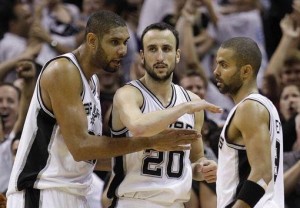Like we are currently seeing in the NFL, the 2011 NBA off-season is up in the air with a lockout looming. Free agency could be delayed and completely restructured depending on the new agreement reached by the owners and players. Still, The Sports Bank continues to break down all thirty NBA teams to see what areas they need to address in the off-season.
After the San Antonio Spurs were upset by the Memphis Grizzlies in the opening round of the playoffs, Tony Parker implied the window has closed on the Spurs being a championship contender. Parker quickly back-pedaled saying that was not what he meant, but the Spurs are dangerously close to being over the hill. A few off-season moves could help keep that window open for another season.
By: David Kay
San Antonio Spurs (61-21 last season)
2010-2011 Season Summary:
The regular season was quite standard for San Antonio as the Spurs exceeded the fifty-win plateau for a remarkable twelfth straight season. All that success over the 82-games went for naught though as the Spurs were bounced from the first round of the playoffs being upset by the eighth seeded Grizzlies.
The most jarring development of the season was the major dip in production from the Big Fundamental, Tim Duncan. His 13.4 points per game was his lowest single season scoring total by about 4.5 points per game. He also failed to top the double digit rebound average for the first time in his fourteen year career. While there are a lot of miles on his legs, head coach Gregg Popovich also purposely cut into Duncan’s minutes to keep him fresh for the post-season. Even with Duncan playing the least minutes of his career, the Spurs were able to win sixty games. However, that freshness was meaningless in the post-season as his court time increased, but his offense actually dipped ever more.
While the team still relied on Duncan, Tony Parker, and Manu Ginobli, there was more of a team approach as eight guys averaged at least seven points per game. Richard Jefferson, Antonio McDyess, and Matt Bonner added to the experienced core of this team while young guys like George Hill, DeJuan Blair, and rookie Gary Neal all meshed in with their roles. The once considered “boring” Spurs actually finished sixth in the NBA in scoring and led the league in three-point shooting. So much for that argument from pretend NBA fans who are sick of seeing this franchise succeed.
This is the annual part of the Spurs season recap where I ask, “Is the end in sight?”
Well judging by the fact that they won 60 games and still have a solid combination of veterans and young players, the window has not closed. But as I heard after the Spurs were eliminated from the Playoffs, “the difference between a veteran team and old team is winning and losing.” As long as the Spurs continue to hang fifty-plus wins in the regular season and have a legit chance come post-season time, they are a veteran team. However, the fall to becoming an old team can happen in the snap of the fingers.
2011-12 Projected Depth Chart:
C: Tim Duncan/Tiago Splitter
PF: Antonio McDyess/DeJuan Blair/Matt Bonner
SF: Richard Jefferson
SG: Manu Ginobli/Gary Neal/James Anderson
PG: Tony Parker/George Hill
Free Agents:
G-Daniel Green (UFA)
SF-Steve Novak (UFA)
PG-Chris Quinn (UFA)
’11-’12 Team Salary: approximately $74 million
Off-Season Needs:
1. Size:
It appears as if Antonio McDyess is going to retire and with the Spurs likely to treat Tim Duncan like a rookie pitcher and limit his minutes, the Spurs could use another big body inside especially since DeJaun Blair is undersized, Tiago Splitter struggled adapting to the NBA in his first season, and Matt Bonner is best suited as being an energy guy coming off the bench and occasionally getting hot from three.
2. Small Forward:
The fact that Richard Jefferson opted out of his contract last season that would have paid him somewhere in the ballpark of $14 million and the Spurs stilled re-signed him to a four-year deal worth nearly $39 is still one of the great mysteries of my lifetime. He brings solid experience, leadership, and is effective role starter but is far beyond the pinnacle of his career and it will look hideous when he is earning more than eleven-million dollars during the 2013-14 season. Without a true back-up, the Spurs should look to add a younger small forward to back-up R.J. and give them more depth on the wing.
3. Defensive Stopper:
As this Spurs team has aged, they also become less effective on the defensive end. Part of the reason they are scoring more is because they have to since they are allowing more points. The Spurs could use a lockdown perimeter defender and a rim protector, or someone that can bring energy on that end of the floor like Bruce Bowen used to do.
NBA TEAM NEEDS/OFF-SEASON PAGES:
ATLANTA HAWKS
BOSTON CELTICS
CHARLOTTE BOBCATS
CLEVELAND CAVALIERS
DENVER NUGGETS
DETROIT PISTONS
GOLDEN STATE WARRIORS
HOUSTON ROCKETS
INDIANA PACERS
LOS ANGELES CLIPPERS
LOS ANGELES LAKERS
MEMPHIS GRIZZLIES
MIAMI HEAT
MILWAUKEE BUCKS
MINNESOTA TIMBERWOLVES
NEW JERSEY NETS
NEW ORLEANS HORNETS
NEW YORK KNICKS
OKLAHOMA CITY THUNDER
ORLANDO MAGIC
PHILADELPHIA 76ERS
PHOENIX SUNS
PORTLAND BLAZERS
SACRAMENTO KINGS
TORONTO RAPTORS
UTAH JAZZ
WASHINGTON WIZARDS
CHECK OUT MY NBA FREE AGENT POINT GUARD RANKINGS
CHECK OUT MY NBA FREE AGENT SHOOTING GUARD RANKINGS
CHECK OUT MY NBA FREE AGENT SMALL FORWARD RANKINGS
CHECK OUT MY NBA FREE AGENT POWER FORWARD RANKINGS
CHECK OUT MY NBA FREE AGENT CENTER RANKINGS
CHECK OUT THE SPORTS BANK’S 2011 NBA MOCK DRAFT
David Kay is a senior feature NBA Draft, NBA, and college basketball writer for the Sports Bank. He also heads up the NBA and college basketball material at Walter Football.com and is a former contributor at The Washington Times Communities.
You can follow him on Twitter at DavidKay_TSB.
